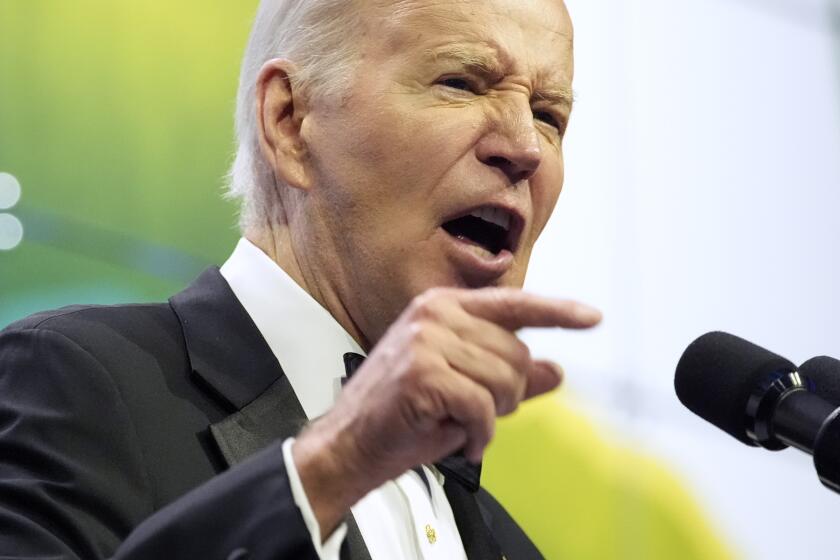Lawmakers Prepare to Sell Pact of Pain
To reach the new bipartisan budget agreement that was completed Sunday, White House and congressional negotiators had to go through five hellish months of bargaining, marathon talks at Andrews Air Force Base and grueling late-night sessions at the Capitol.
But, as Senate Majority Leader George J. Mitchell (D-Me.) said, “Now comes the hard part”: The leaders must sell their package of pain to the American people and to their representatives in Congress.
“Everybody wants something to pass, but very few people want to vote for it,” said Sen. Phil Gramm (R-Tex.), whose 1985 Gramm-Rudman law forced the deficit-reduction plan.
The accord now must be put into legislation, passed by Congress and signed by President Bush. The agreement gives the lawmakers until Oct. 19 to pass legislation enacting the specific spending cuts and tax changes called for in Sunday’s budget pact.
“We’ve got a lot of heavy lifting to do,” Gramm noted.
The proposed package will affect every American, or--perhaps more important--every voter. And with November elections fast approaching, it will be that much tougher for senators and House members to support the kinds of sweeping changes that must be enacted in the next few weeks.
“Who wants to vote for Medicare cuts? Who wants to vote for Social Security cuts? Who wants to vote for a gasoline tax?” Sen. Trent Lott (R-Miss.) asked in voicing the anxieties of many rank-and-file members of Congress.
Such leaders as Sen. Pete V. Domenici (R-N.M.), the ranking Republican on the Senate Budget Committee, are answering that question with one of their own:
“Can you support the entire package in order to fix the deficit of this country, get us on the right track, get interest rates down and bring the American economy back into a job-producing mode?”
Similarly, House Majority Leader Richard A. Gephardt (D-Mo.) told fellow Democrats at a recent caucus that “you’ve got to understand--there is no pleasure in this package. But you’ve got to look at the positive side of getting it done.”
Congressional leaders know well the difficulty they will face in trying to hammer the package into law.
“It will be very tough because it has a lot of pain and a lot of sacrifice,” said Rep. Leon E. Panetta (D-Carmel Valley), chairman of the House Budget Committee. “I’m afraid that not enough groundwork has been laid with either the public or the members.”
“We’ll know in a couple of days,” Panetta said.
Leaders of both parties say President Bush must play a key role to get any agreement approved by Congress. And he will have to help muster broad public support for the package through a nationally televised address aimed at persuading lawmakers to vote for it.
“I think it’s going to be difficult to pass a deficit-reduction package of this historic size unless there is bipartisan support,” said House Majority Whip William H. Gray III (D-Pa.). “The President has got to be out there leading, and it’s going to be very, very difficult.”
Bush, for his part, seemed to recognize that on Sunday, pledging that although “there will be tough fights ahead,” he would do “everything in my power . . . to get this passed in the United States Congress.”
Domenici agreed that there is “a great question” as to whether the package could be pushed through.
Lawmakers from more-affluent districts are concerned about tax, Social Security and Medicare changes. Those from working-class areas are worried about proposed cuts in health care or tax increases on gasoline, beer and cigarettes.
“If I go back to Atlanta and say we held the line on capital gains but we did you in on Medicare, they’ll say you’re not bringing us good news,” said Rep. John Lewis (D-Ga.).
Sen. Alan Cranston (D-Calif.) announced his support for the package, even though he acknowledged that he did not know full details of the plan.
“This is the first blank check I’ve signed in 22 years in the Senate,” Cranston said. “But I believe it is so important to avoid untold chaos in the important operations of our federal government.”
Rep. Ronald V. Dellums (D-Berkeley), chairman of the Congressional Black Caucus, has urged his colleagues to vote against any budget agreement that “further savages already decimated programs in housing, health care, education and job training.”
Rep. Silvio O. Conte (R-Mass.), a negotiator in the talks that finally ended in agreement and one of the few Republicans who originally favored a tax increase to address the deficit problem, has said that Congress must be made to understand that it faces the stark choice between accepting a bipartisan deficit-cutting package or allowing crippling spending cuts to take place under the Gramm-Rudman deficit reduction law.
“We can’t give them any wiggle-room,” Conte said he advised House Speaker Thomas S. Foley (D-Wash.).
Under the ground rules for ratifying the new accord that were agreed to by the President and Democratic congressional leaders, a majority of each party in both the House and the Senate must approve any deal or it will not take effect.
Achieving this result appears to be more difficult in the House--whose members all will face the voters in November--than in the Senate, only a third of whose members are up for reelection. But it will be tough in both chambers to get the necessary votes.
Congressional Democrats who emerged from a caucus late last night said their party leaders had asked them to hold their fire for 24 hours and take a closer look. “I’m keeping my powder dry,” said Rep. Barbara Boxer (D-Greenbrae).
One wild-card in any ratification process will be House Minority Whip Newt Gingrich (R-Ga.), a participant in the budget talks who has a large following among conservative Republicans. He had declared his unhappiness with the White House negotiating position.
Gingrich aides said that he may be able to influence more than half of the 175 Republicans to follow his lead in any ratification process, potentially threatening approval of a package that he and his supporters do not accept.
Some Democrats also are unhappy with the course of the budget talks.
They argue that Democratic negotiators made concessions on such issues as Medicare that never would have been made in the normal legislative process, where Democrats have a 3-2 edge over Republicans in the House and a 55-45 advantage in the Senate.
Two early battlegrounds in the ratification process will be the House Ways and Means Committee and the Senate Finance Committee. Both panels have jurisdiction over not only tax matters but also the politically explosive Social Security and Medicare issues.
Thus, Rep. Dan Rostenkowski (D-Ill.) and Sen. Lloyd Bentsen (D-Tex.), the panels’ chairmen, will be prominent players in the battle known as “reconciliation”--the act of reconciling current laws with the spending cuts and tax increases in the proposed package.
More to Read
Get the L.A. Times Politics newsletter
Deeply reported insights into legislation, politics and policy from Sacramento, Washington and beyond. In your inbox three times per week.
You may occasionally receive promotional content from the Los Angeles Times.






